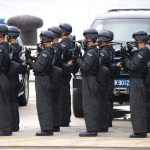The Political Sacrifice of Schapelle Corby

Schapelle Corby’s parole period is coming to an end. After spending almost a decade behind bars in Indonesia on a conviction of trafficking cannabis – a drug that is now legal in eight US states – Ms Corby will finally be allowed to return home to Australia later this month.
Ms Corby was diagnosed with severe mental health issues in 2009, after years of suffering the ravages of Bali’s Kerobokan prison, from which she was released in February 2014. But the true horror of Corby’s story is that she’s spent close to 13 years in exile for a crime many believe she did not commit.
That’s the argument presented in the documentary Expendable: The Political Sacrifice of Schapelle Corby. Some will label it a conspiracy theory, but the case made by a group of academics from around the globe known as the ‘Expendable Project’ is compelling to many others.
On 8 October 2004, Ms Corby arrived in Bali on Qantas flight AO 7829 from Sydney, after an initial flight from Brisbane. On arrival, Indonesian authorities found 4.2 kilograms of marijuana in the 27-year-old’s body board bag.
Ms Corby was subsequently sentenced by Denpasar District Court to 20 years in prison on 27 May 2005.
The Expendable Project spent three years researching her case, reaching the conclusion that the Australian government was complicit in covering up her innocence, turning all its “organs of state upon one of its own citizens for political expediency.”
The reasons for the cover up
Corby’s case came just a few years after the 9/11 terrorist attacks changed global views on airport security. The documentary makes it clear that it was a priority for the federal government to hide criminal conduct that was rife at Australian airports.
In order to save face and maintain relations with Indonesia, the Howard government is alleged to have concealed information, enlisting the services of the Australian Federal Police (AFP) and shaping public opinion by using the ABC.
Those boys in blue
In March 2005, John Patrick Ford, an inmate from Port Phillip prison, claimed to have heard multiple conversations about baggage handlers being involved in a drug smuggling ring, and that one bag of drugs bound for Sydney ended up in Denpasar.
Weeks before Ms Corby was found guilty, AFP police commissioner Mick Keelty publicly declared, “There is very little intelligence to suggest that baggage handlers are using innocent people to traffic heroin or other drugs between states.”
The commissioner’s assertion was far from the truth. At the time of Corby’s arrest, the AFP and NSW police were in fact conducting Operation Mocha: an investigation into the role of baggage handlers moving drugs between airports for crime syndicates.
Three weeks before Corby’s sentencing, Ray Cooper, the AFP’s former head of operations of internal investigations, told the Nine Network that it was well-known passengers were being used as “mules” to shift drugs between domestic airports.
Mr Cooper said the AFP had failed to properly investigate the allegations, as serving police had been involved.
Indeed, the head of Operation Mocha, then-NSW Crime Commission (NSWCC) chief of investigations Mark Standen, was arrested in 2008 and subsequently imprisoned for plotting to import 300 kilograms of pseudoephedrine, a precursor used to make ice.
Mr Keelty made his public statement despite being fully aware that Operation Mocha was on foot. It was a comment that then-president of the Law Council of Australia, John North, said could jeopardise Corby’s chances of a fair trial.
Evidence lost and destroyed
The Expendable Project also highlighted the fact that despite an Australian being found with over four kilograms of allegedly home grown cannabis at an international airport, the AFP failed to launch an investigation into the matter.
The Corby house was not raided, and no arrests were made in Australia.
The researchers have documented how Schapelle repeatedly requested that the cannabis be forensically tested and fingerprinted. The AFP publicly claimed that they had offered to carry out this testing, but in fact never did so.
Corby’s lawyers revealed that Bali police had asked for the AFP’s help with the prosecution, but Australian police refused to assist. And in March 2006, Bali prosecutors burnt all the physical evidence used to convict Corby.
Corby’s defence lawyers also requested CCTV footage from Brisbane domestic airport, and Sydney’s domestic and international airports, but the AFP told them there was none available.
A bungled delivery
In July 2005, William Moss publicly stated that he was meant to collect the drugs found in Corby’s luggage from Sydney airport, and that they were never intended to arrive in Bali. Moss was subsequently ridiculed in the Australian press.
However, in 2012, the Expendable Project published minutes from a meeting of the NSWCC, which revealed that the commission had a recording of Moss discussing the marijuana collection with John Dunks.
Mr Dunks was a known associate of corrupt NSW police detective Christopher Laycock.
A top level cover up
Schapelle Corby’s appeal took place in July 2005. The researchers of the documentary obtained evidence in 2010 that the AFP and federal government received information around the time of the appeal that may have led to Corby’s release.
A briefing note from the AFP to then-Australian minister for justice and customs Christopher Ellison dated 6 July 2005 outlines that Corby’s body board bag had never been scanned before being put onto the flight. This was despite it being mandatory for all baggage to be scanned.
The justice minister then sent a letter to Mr Keelty stating that this information “may be a relevant factor in any consideration as to whether there was any interference with the bag.” Mr Ellison ends the letter by asking the police commissioner whether he had informed anyone else about this information.
However, Ms Corby’s defence team was simply told there was no baggage data available. They were never informed that the body board bag was the only piece of baggage that was not scanned on the flight, and that it had been treated differently by airport staff prior before it left Australia.
A cold betrayal
This potentially determinative evidence was withheld from Ms Corby’s lawyers. It was never presented as evidence and did not come before the court. And yet, some of Australia’s top officials were aware it existed, and that it could change the outcome of her appeal.
As Ms Corby prepares fly back to Australia on 27 May, she may very well be looking forward to seeing those who have supported her from the start. But, with Australian authorities having failed her at the highest level, it may be an uneasy return.








